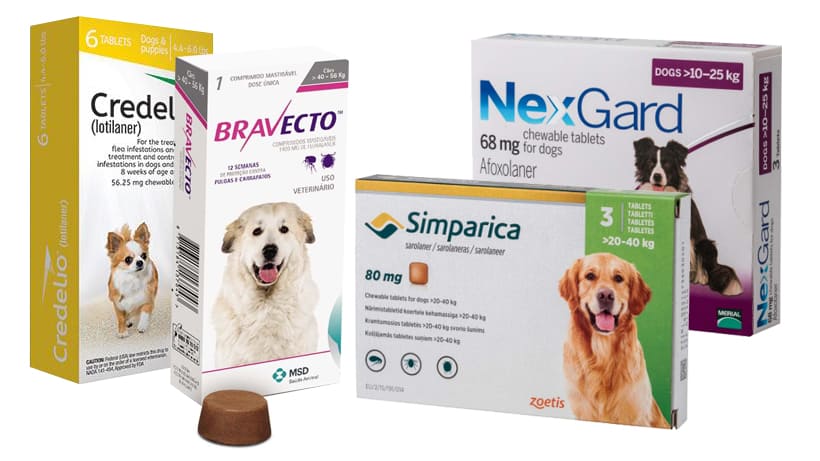“This post contains affiliate links, and I will be compensated if you make a purchase after clicking on my links.”
The U.S. Food and Drug Administration is warning pet owners and veterinarians of the risk of serious neurologic events including seizures, muscle tremors, and ataxia in dogs and cats treated with certain flea and tick medications.

Pet owners using flea and tick medications in the isoxazoline class – specifically Bravecto (tablets for dogs OR topical for dogs or cats), Nexgard (tablets for dogs) or Simparica (tablets for dogs), Credelio (tablets for dogs) and Revolution Plus (topical solution for cats) – are urged to closely monitor their pets for adverse neurologic events.
Since these products obtained their respective FDA approvals, data received by the agency as part of its routine post-marketing activities indicates that some animals receiving Bravecto, Nexgard or Simparica have experienced adverse events such as muscle tremors, ataxia, and seizures. Another product in this class, Credelio, recently received FDA approval. These products are approved for the treatment and prevention of flea infestations, and the treatment and control of tick infestations.
The FDA is working with manufacturers of isoxazoline products to include new label information to highlight neurologic events because these events were seen consistently across the isoxazoline class of products.
The FDA carefully reviewed studies and other data on Bravecto, Credelio, Nexgard and Simparica prior to approval, and these products continue to be safe and effective for the majority of animals. The agency is asking the manufacturers to make the changes to the product labeling in order to provide veterinarians and pet owners with the information they need to make treatment decisions for each pet on an individual basis. Veterinarians should use their specialized training to review their patients’ medical histories and determine, in consultation with pet owners, whether a product in the isoxazoline class is appropriate for the pet.
The FDA continues to monitor adverse drug event reports for these products and encourages pet owners and veterinarians to report adverse drug events. You can do this by reporting to the drugs’ manufacturers, who are required to report this information to the FDA, or by submitting a report directly to the FDA.
To report suspected adverse drug events for these products and/or obtain a copy of the Safety Data Sheet (SDS) or for technical assistance, contact the appropriate manufacturers at the following phone numbers:
Merck Animal Health (Bravecto): 800-224-5318
Elanco Animal Health (Credelio): 888-545-5973
Merial (Nexgard): 888-637-4251
Zoetis (Simparica): 888-963-8471
Pet owners and veterinarians who have additional questions can contact [email protected] or call 240-402-7002.
























Sue Ann Hough
says:We started our mutt on Simparica Trio at 12 months. At age 2 he started having seizures. Which came first? The side effect or epilepsy? How can you know for sure?
E Shafer
says:The facts are that the FDA has issued warnings since 2018 and again in 2019 about the neurologic events from isoxazoline pesticide treatments and chews. In response to earlier comments, there is nothing inflammatory about the information or wording in this article. The FDA has required that the warnings in the packaging be reworded to reflect the recognized neurologic risks. Not all dogs react but some dogs have serious reactions that lead to permanent damage or death. My own dog experienced this and we lost her after months of seizures and loss of motor control that broke my heart. I’ve spoken with others who have lost young dogs, puppies, and adults, or who are dealing with the long term aftereffects. Pet owners have a right to be adequately warned, the the FDA has a responsibility to both notify us and if necessary review the safety of products on the market to protect consumers and our pets. We’ve dealt with tick disease and I take it seriously, but I would choose other products and would never use any of these again.
Stasi
says:Every one of these drugs has been tested extensively and used for several years and shown to be safe. They are not sold over the counter. Every one of these drugs is sold as a prescription product so the person must go through a veterinarian and have their pet assessed in order for it to be given. I think this is a very inflammatory article and it’s very inaccurate how it portrays these particular drugs. It scares people when there is no need to be scared. That’s why you have to get them from a veterinarian. And yes I am a member of the veterinary community and yes we do prescribed these things. And no we have not had problems with reactions on any of these drugs. What we have had is animals that don’t come down with a lifelong case of Lyme disease or ehrlichiosis or anaplasmosis or flea allergy dermatitis.
Stephanie Babcock
says:Thank you. I am also in the veterinary (and rescue) community and these drugs work wonders for the majority of animals. I have seen a dog and a cat die from water toxicity but I have never seen an adverse event with one of these drugs. Obviously we are not going to advise against leaving water out for pets, but it goes to show how literally ANYTHING can cause an adverse event in certain individuals. Please do not panic. Follow the correct channels and get prescription drugs prescribed by a professional. We are not trying to take your money when we require an exam; we are trying to help keep your pet safe and healthy.
Michael
says:I have no doubt that these medications work fine for most pets however my husky has been the picture of health for almost 7 years and was recently put on simparica. The day I gave it him he had a horrible seizure followed by daily muscle twitches. The vet and I thought it was from something else so a month later upon his second dose the muscle twitches got worse and he was having balance issues. Simparica paid my vet to run a full blood/urine test and found nothing. I’m not saying simparica is evil poison, but people should be aware that there are pets that don’t react well to it and should pay attention when giving these meds to their pets.
STACEE Y SEVERINO
says:Of course someone working in the “veterinary community” would say this crap! The flea and tick caused diseases you mention are all treatable with antibiotics and if caught early are all curable! Unlike neurological damage that these horrible poisonous pesticides can cause! We all know that veterinarian practices thrive on prescribing medications and these unnecessary and lazy treatments for flea and tick control. There are all natural alternatives out there folks. Do your homework and help keep pesticides and poisons out of your pets lives!Ha “flea allergy dermatitis” bfd seizures on the other hand horrible!!
Miriam Nathan
says:Warning on the package is not enough, few people read them and sales people are not interested in planting doubts in consumers’ minds. So, these drugs should be recalled !!!